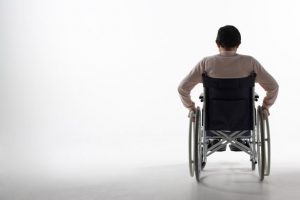Paraplegia Injury
Paraplegia injuries - a catastrophic condition

Paraplegia Wheelchair Accident Injury
Paraplegia Injury - The health condition named paraplegia means "paralysis of lower limbs." Paraplegia refers to the loss of function of the legs and in some instances possibly the trunk of the body. In essence, a paraplegic person suffers from complete or incomplete paralysis of the lower body. The severity in function loss depends upon the severity and location of the damage to the thoracic spinal cord. The Thoracic Nerves (T1-T12) are segment levels of the spine which are located in the mid section of the spinal cord. In laymen's terms, it's the segment from the bottom of the shoulder blades to the dip of the back. The trauma to the spinal cord in this area causes the loss of function of the limbs. This renders the victim paralyzed downward and severely limits their ability to ambulate. People who suffer from paraplegia have, in some way, sustained damage to the thoracic spinal cord between segment levels T1 and below. Accident injuries that result in paraplegia are drastically life-changing, financially costly, and emotionally devastating for the victim and their family members.
According to statistics provided by Mayo Clinic, the top three causes of paraplegia are injuries resulting from car accidents, falls, and sporting events. Car accidents make up over forty percent of new spinal cord injuries. This is an alarming statistic that is probably even higher in Southern California, the Inland Empire, Los Angeles County, Orange County and Riverside County.
Symptoms of Accident Injury Paraplegia
Upon visual inspection of a paraplegia patient, the most notable symptoms are motor and sensory impairment to the legs and trunk. In some cases, loss of function affects the torso as well. This results in complications in controlling bladder and bowel activity, loss of sexual function, and difficulty with digestion and breathing. Sensory loss can affect a patient with sensations of numbness or neuropathic pain.
Paraplegic symptoms may differ depending on the segment level where the thoracic spinal cord has been injured. Trauma between T1-T5 usually affects the ability to control the upper chest, mid back and abdominal muscles. The person's legs are usually paralyzed but function of arms and hands may remain normal. Damage between T6-T12 usually affects control of the lower trunk and both legs, however the function of arms and hands usually remains normal. A person who sustains a severe injury at T1 will probably suffer from loss of function from the chest and below, and may be required to use a ventilator for assistance with breathing. A person with damage at segment level T12, will likely lose function from the lower abdomen and below, but they will most likely have normal control over their upper body.

Paraplegia Injury
The degree of severity of the damage done to the cellular structures of the spinal cord segments will make a big difference in the results of the injury. For example, a complete severing of the spinal cord will result in total loss of function from that segment level and below. On the other hand, a partial severing or even a serious bruise may result in varying degrees of paralysis or impairment of function. The idea that all paraplegic patients are unable to move their legs is a common misconception. In reality, many people who suffer from paraplegia are able to move their limbs to a certain degree, some people can even stand or walk after getting proper treatment; this all depends on the degree of severity of the initial damage.
Compensation for Catastrophic Paraplegia Accident Injuries
Injuries that result in paraplegia are especially life-changing, will result in very expensive medical bills, and will often times require life-long medical assistance and attention. If a person has sustained an injury that resulted in paraplegia due to the negligence of another party, it is only fair to expect significant compensation for such an injury. Injuries such as this are exceptionally severe. A victim may be entitled to compensation in order to cover costs including:
- personal attendant costs
- initial medical bills and expenses
- long-term rehabilitation and care costs
- costs of medical/adaptive devices (wheelchairs, motorized chairs, ventilators, ramps)
- emotional distress
- pain and suffering
- loss of enjoyment of life
- loss of income and potential earnings
Presently, the value of a complete life-care plan ranges in the millions of dollars. Monetary compensation for such a severe injury should not only cover incurred medical expenses, but all future expenses as well. Unless future costs are covered, a person with paraplegia will not have the ability to ambulate and take care of themselves into the future.
Read Further Accident Lawyer Help
Paraplegia Accident Lawyer Lawyer help - Contact Today!
Injury Lawyer
844-984-4878
Our Promise:

